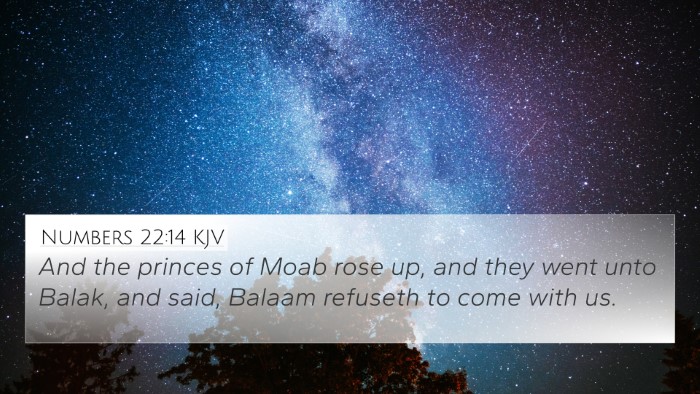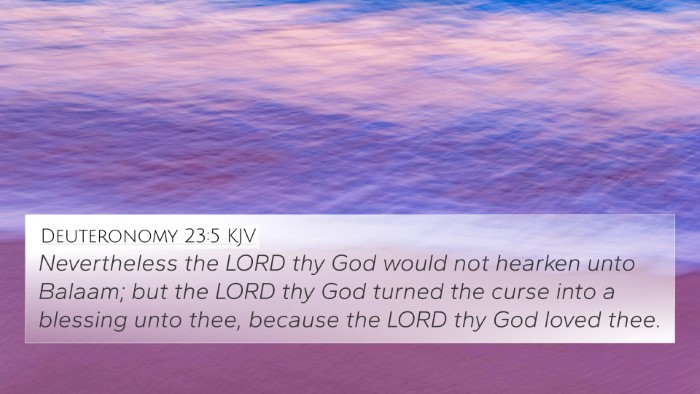Understanding Numbers 22:13
Verse Text: "And Balaam rose up in the morning, and said unto the princes of Balak, Go your way into your land: for the LORD refuseth to give me leave to go with you."
Summary of Meaning
In Numbers 22:13, we see a pivotal moment in the narrative of Balaam, a non-Israelite prophet, and Balak, the king of Moab. This verse highlights Balaam's obedience to God as he communicates his inability to accompany Balak's emissaries.
The refusal serves as a testament to God's sovereignty and guidance in the decisions of individuals. The implications are profound, reflecting God's presence among His chosen people and establishing a clear distinction between divine approval and disapproval.
Commentary Insights
-
Matthew Henry:
Matthew Henry emphasizes the moral and spiritual lessons in Balaam's response. He illustrates that genuine obedience to God often involves facing pressures from powerful entities like Balak.
Balaam's integrity shines through his refusal to compromise God's command, showcasing the importance of fidelity to divine instruction.
-
Albert Barnes:
Barnes notes that the Lord’s refusal indicates His displeasure towards the actions of Balak and the Moabites.
This verse reflects how God intervenes in human affairs to redirect actions according to His purpose, reinforcing the idea of God as the ultimate authority over both Israel and foreign nations.
-
Adam Clarke:
Adam Clarke provides a deeper insight into Balaam's character, suggesting his hesitance as a struggle between personal gain and spiritual duty.
Clarke argues that this moment illustrates the serious nature of prophetic calling, wherein individuals must prioritize divine messages over worldly temptations.
Bible Verse Cross-References
Numbers 22:13 can be linked to several other scriptures that deepen the understanding of the themes presented:
- Numbers 22:20: Balaam's initial encounter with God, which emphasizes God's directive for him.
- Exodus 23:21: A reminder to heed the warnings of God, further emphasizing obedience to divine authority.
- Proverbs 16:9: "A man's heart plans his way, but the Lord directs his steps," highlighting God’s control over human plans.
- Deuteronomy 23:3-6: The distinction between Israel and its enemies, underlying God's favor upon His people.
- James 4:7: "Submit yourselves, therefore, to God," connecting the theme of submission in alignment with God's will.
- 1 Peter 5:5: Highlights the call for humility before God, as Balaam displayed in his obedience.
- Galatians 1:10: The idea of serving God over pleasing men, resonating with Balaam's predicament.
Thematic Bible Verse Connections
This verse is emblematic of various themes within the Bible:
- Obedience to God: Central to the Christian faith, seen in the lives of various biblical figures.
- The Sovereignty of God: God’s ultimate authority in directing human affairs, prevalent from Genesis to Revelation.
- Spiritual Integrity: Balaam’s choice represents the conflict between spiritual duty and earthly rewards.
- The Distinction Between God's People and Others: A recurring theme in the Old Testament emphasizing God's chosen nature of Israel.
Cross-Referencing Biblical Texts
To engage in effective cross-referencing, one can utilize the following tools and methods:
- Bible Concordance: A tool for identifying keywords and their occurrences throughout the Bible.
- Bible Cross-Reference Guide: Helps locate verses that complement or contrast with specific passages.
- Cross-Reference Bible Study: A method of studying scripture that involves examining connections between verses.
- Identifying Themes: Relating verses through thematic studies, providing a deeper understanding of biblical messages.
Inter-Biblical Dialogue
The concept of inter-biblical dialogue refers to the connections and conversations between Old and New Testament texts.
This can be explored through comparative studies of characters, themes, and prophecies.
Conclusion
In summary, Numbers 22:13 conveys a powerful message about the importance of obeying God's commands amidst outside pressures.
The layers of meaning can be enriched through careful cross-referencing with related scriptures, illustrating a broader theme of divine authority and human integrity throughout the Bible.




